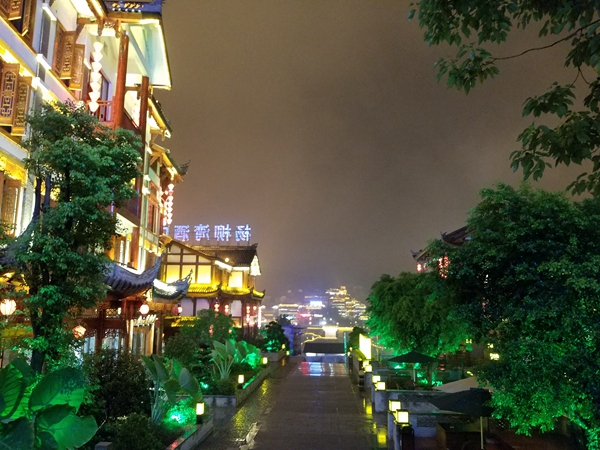


 |
|
Every building, bridge and street in Moutai town in Guizhou province is lit up in yellow, Sept 10, 2016. [Photo by Faisal Kidwai/chinadaily.com.cn] |
As our bus climbed the meandering road through the steep mountains and green hills, it was the color under the clear night sky that caught our attention. Like a bride dressed in red on her wedding day, the town was sparkling in yellow. It was streaking across rooftops, doors, windows, bridges and even streets.
Even before our senses could recover, we were hit by something else: the smell of liquor in the air. It meant only one thing: we were now in Moutai town, the home of China's most famous wine, in Renhuai city, Guizhou province.
Located on the banks of Chishui River, it is one place that will leave a visitor intoxicated in more than one way. From the laser light show and dancing fountains near the river to ceramic jars storing the liquor in shops, the town serves something that's truly different.
But it's not just Moutai whose memories will stay with you long after you leave its narrow cobblestone alleys.
Guizhou has long been described as "not three feet of flat land, not three days without rain, not a family with three silver coins".
It's time to bury the last description.
Today the province is posting double-digit growth, with its GDP in 2015 crossing the one-trillion-yuan mark. It now has airports that connect to all parts of the country, a high-speed rail network and gleaming highways. From a place that not long didn't even have a decent highway; it's now driving on the information superhighway.
The economic turnaround is just one part of the story. By far the most interesting chapter – and the one that will change the landscape of this mountainous province – is its natural beauty.
Whether it's the colorful culture of Miao ethnic group, famous for its hair buns, or Dong ethnic group, known for its unique dresses, or Huangguoshu Waterfall, the largest waterfalls in the country, Guizhou is still unspoiled and unexplored.
With more Chinese traveling than ever before, the province, which has spicier food than the more famous Sichuan cuisine, is poised to see its tourism industry grow.
However, what left a lasting impression on me after a recent trip was the simple and helpful nature of its people. I was standing on a mountain road with my colleague in Liping county trying to reach a scenic spot on a hill, but there were no buses or cars available as it was already getting dark. Then a guy driving an SUV stopped and gave us a ride.
On the way, he and a woman sitting next to him halted the vehicle and let us photograph the famous rice terraces of the province. But that was not all. Once we reached the scenic spot, the woman came with us and not only showed us the whole village, but also offered to parcel an authentic dress of Dong ethnic people. It was already dark by the time we finished the tour but both of them drove us back to the hotel.
When on the last day of my trip to the province, a journalist based in the capital Guiyang heard that I will not have time to buy the spicy Lao Gan Ma, or Old Godmother, chilli sauces, she volunteered to courier it to Beijing.
I reflected on these kind acts, the rapid pace of development and the rugged but equally enchanting terrain as the plane flew into the clear blue sky.
